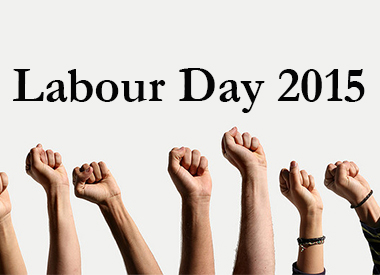Like this article? rabble is reader-supported journalism. Chip in to keep stories like these coming.
Another Labour Day is here and it is time to celebrate. But before you sit around the Labour Day tree with your (union) family and sing your favourite songs about worker solidarity, take a moment to refresh yourself on the battles Canadian unions have fought, are still fighting, and may continue to fight, depending of course on the result of the federal election on Oct 19.
Here are (just!) 11 of the battles the Canadian labour movement fought this year:
-
With an election looming, federal unionized employees alerted Metro Ottawa that they were being warned against participating in any political activities during the campaign period by management. Debi Daviau, the president of the Professional Institute of the Public Service of Canada, told Metro that some of the memos sent out were “intimidating in tone.”
-
Since Canada Post announced they would cut door-to-door, along with a number of jobs, in 2013, the Canadian Union of Postal Workers (CUPW) has gone to the mat to fight to keep the service going. In Oct 2014, CUPW announced that they, along with several community organizations, would challenge the decision in federal court.
-
The good news is that support for door-to-door service has come from several municipal bodies. Hamilton city council enacted a bylaw that charged Canada Post for every community mailbox they installed. However, the law was later struck down by an Ontario Superior Court judge. And Montreal mayor Denis Coderre made an attempt at a dramatic gesture when he took a jackhammer to a community mailbox platform — though the results weren’t quite as spectacular as he intended.
-
CUPW also accused Canada Post of union busting after they ended a contract with unionized staff at its international plants.
-
In ongoing Canadian Senate shenanigans news: Conservative senators started yet another major controversy when they voted against the speaker of the house — also a Conservative — to force a vote for Bill C-377, which amends the Income Tax act so that all labour organizations have to provide detailed financial information to the Canadian Revenue Agency. The Canadian Labour Congress’s (CLC) Chris Roberts told rabble that unions nation-wide plan to fight the bill.
-
It was a major victory for labour this year when the Supreme Court ruled that Saskatchewan’s essential service law is unconstitutional. The law, enacted in 2007, prohibited public sector workers from striking. The positive decision was seen as evidence that the right to strike is constitutionally protected in Canada. However, Saskatchewan premier Brad Wall was quick to invoke the threat of the notwithstanding clause.
-
CLC president Hassan Yussuff was just one of the many peolpe who travelled to Ottawa to speak out against Bill C-51 this year. The bill, which has been touted as an anti-terrorist bill, may not have been a direct attack on labour, but Yussuff told the committee that the bills reach could stifle labour strikes and unrest.
-
Nova Scotia’s health-care unions struggled to make a deal with the provincial government for the better part of the year after the a new bill streamlined health services while also shifting workers into different unions, sometimes without their consent. However, the four unions involved — NSGEU, NSNU, CUPE and Unifor — were able to form bargaining councils to continue their collective bargaining process. Ella Bedard, rabble’s labour reporter, broke down the three things that tipped the scales in the unions favour.
-
Ontario’s provincial budget had the Ontario Public Service Employees Union (OPSEU) raising alarms about austerity measures. In order to balance the budget by 2017, Wynne’s Liberals announced that program spending increase would only be 1.4 per cent, an amount which Bedard explained amounts to a spending freeze or a reduction.
-
Ontario teachers haven’t had an easy year either — in May, striking teachers in Durham, Peel and Sudbury were forced back to work after a three-week strike. The Elementary Teachers Federation of Ontario are still in negotiations over their contract, with school starting very soon.
-
LGBTIQ public servants who were forced out of their jobs after they were outed during the red scare of the 1950s are now vocally demanding an apology from the federal government.
For more labour information and action, please visit our labour issues page.



